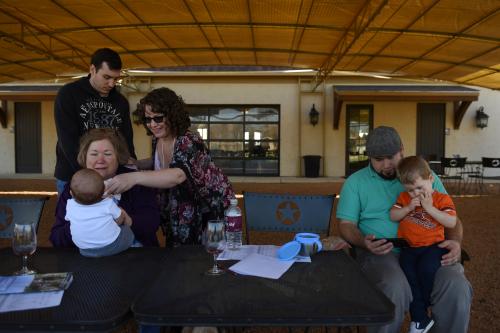If you want more content like this, subscribe to our newsletter.
Welcome to a special edition of Class Notes highlighting our latest publication, “A New Contract with the Middle Class.” The Contract contains policy ideas to improve the quality of life of middle-class Americans in five key areas: money, time, relationships, health, and respect.
- To address middle-class Americans’ needs, the Contract emphasizes three core principles: Partnership—i.e. work with the middle class; Prevention—create preemptive policy (as we put it “fences at the top of the cliff rather than ambulances at the bottom”); and Pluralism—embrace differences in the middle class, not least by race.
- The Contract’s top chart shows income growth straggling for the middle class.
- Isabel Sawhill and Richard Reeves argue that our actions—and our communities’—shape our lives, as they should. But the government ought to play an active role in creating the chance for a “good life.”
- Finally, enroll in our free email course that breaks down the obstacles facing the middle class, and policies to address them.
Partnership
This is a contract with the middle class, not for the middle class. In that spirit, we highlight policies that reward work and service, and give middle-class Americans opportunities to succeed, not handouts. For example: college should be free, but only for those who undertake a year of national service; health care should be better, but we each need to take more responsibility for our health; and parents should be given more time for their kids, but we also need to be open to work until later ages.
Prevention
Policy also needs to shift towards prevention. Too often public policy is focused on dealing with the costs and consequences of earlier failures—providing ambulances at the bottom of a cliff, rather than building fences at the top. For the middle class, preventative policy means reducing the need for health care by investing in health (e.g. nutrition, social services). It means ensuring every child is raised by a family ready to care for them by proving universal access to reproductive health. And it means preventing parents from losing ground in their career by providing childcare and creating parent-friendly work policies.
Pluralism
Pluralism is also essential here; America is a large, varied, changing society. Individuals and communities differ, often greatly, in terms of what they want from life. This kaleidoscopic diversity is one of our greatest strengths, and our democratic processes should be inclusive of a wide range of voices. For example, “Citizens Juries” comprised of a wide range of Americans should guide policy.
Top chart: Sluggish middle-class wage growth
The Contract’s top chart highlights wage growth by income quintile over the past 40 years. Wage growth for the top 20% of income earners was over 5 times that of the middle 20% of income earners from 1979 to 2019.
Choice opinion: The role of the government in creating a good life
“A good life cannot be delivered, neatly packaged, by the government. The quality of our lives is to a large extent in our own hands – and most of us like it that way. The actions of individuals, communities, and institutions are, in many cases, much more important than public policy. This is a feature of liberal societies, rather than a fault. But it is also nigh impossible to create a good life in a hostile, dog-eat-dog society. Capitalism is the right way to organize an economy, but not a good way to organize a society. All that said, there are also many goals that can and should be pursued through state action. Our view is that in recent years, too little has been asked of government, not too much.”
Self-promotion: Chasing the Dream in our free email course
This October, we are offering a free email course based on “A New Contract with the Middle Class” that breaks down key issues facing the middle class and how to solve them. Our course was developed using data and real stories from Americans around the country to answer some tough questions: Are middle-class Americans thriving or struggling? What are their primary challenges, and how can we solve them? Enroll here.
The Brookings Institution is committed to quality, independence, and impact.
We are supported by a diverse array of funders. In line with our values and policies, each Brookings publication represents the sole views of its author(s).









Commentary
Class Notes: Our New Contract with the Middle Class
Wednesday, September 23, 2020